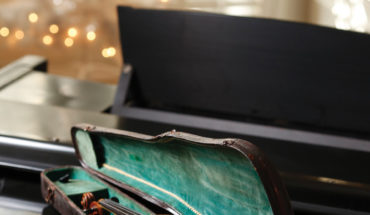Tumbao frontman Diego Avilez talks about art and advocacy through Latin music.
by Katie Pate | photography by Joshua Steadman
Raleigh’s music scene has changed over the past decade: from bluegrass to indie to hip hop and more, our local venues are slowly incorporating more variety and inclusivity. And one of the biggest supporters of the evolving musical climate is Diego Avilez, a multi-instrumentalist, singer and community organizer who’s also the frontman for Latin fusion group Tumbao.
Avilez works as a disability law case manager by day; but by night, he teaches music from his home studio, is a member of two bands, maintains a career as a solo artist and organizes events in the Triangle. He frequents Triangle mainstays like The Pour House, Lincoln Theater and Shakori Hills as a soloist and with various projects and bands.
Last year, Avilez hosted a benefit for Hands On Peru, an organization that supports medically underserved communities. Held at Transfer Co. Food Hall, attendees raised over $10,000 in just five hours. But as he was pulling it together the year before, he struggled to find a Latin music group available to perform at the event. The solution? Avilez and six other musicians came together to fill the gap. It was such a hit that the group formally organized, calling themselves the Latin All Star Band. Soon after, the ensemble rebranded as Tumbao, after a traditional Afro-Cuban rhythm. It is now one of Raleigh’s fastest up-and-coming musical acts.
Avilez sings and plays piano, accompanied by musicians on the congas, trumpet, drums, bass, saxophone and guitar. Tumbao’s sound delves deeply into Latin fusion, “We pay homage to various styles of Latin music of the Americas and the Caribbean and also takes influences from our own backgrounds,” says Avilez.
The band’s style varies from song to song, floating between salsa, bossa nova, funk and Afro-Cuban beats. They released a single in January, expect their first EP this spring and have an impressive slate of upcoming shows. The group is quickly entering the canon of Raleigh’s most beloved bands.
Avilez spent his early childhood in Lima, Peru where his passion for music and penchant for civil service began. In 2000, his family immigrated as refugees to New York City. In adolescence, Avilez learned about Latin music at church, in Manhattan’s night life and even through his Jamaican barber, who taught him about reggae. “I was just pumping, pumping, pumping, getting all of this music and these styles into me,” he says. “I decided to live a life surrounded by music.”
While Avilez was in high school, his family relocated to North Carolina, where he found his place in the community. But it was not always easy for Avilez to bring exposure and respect to Latin music. At times, he and fellow musicians faced (and still do face) difficulty in educating local audiences and those booking shows about the value of their work. “As open as the city is, and as welcoming as the scene is, there’s still so much work to be done,” he says. “And the people who will tell you that are mostly people of color.”
Avilez aims to educate people through music and to bring Latin culture into Raleigh’s music scene, which has largely been lacking until recently. Avilez says he has learned the music he plays is “tied directly with inclusivity” and hopes to bring together people of all ages and backgrounds at the events where he performs and hosts.
“Latin music is music that’s for everybody,” he says. “It’s music that builds community.”



